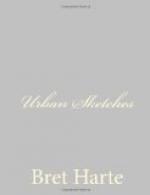It may be parenthetically stated here that the songs alluded to above may be found in sheet music on the top of the piano of any young lady who has just come from boarding-school. “The Old Arm-Chair,” or “Woodman, spare that Tree,” will be also found in easy juxtaposition. The latter songs are usually brought into service at the instance of an uncle or bachelor brother, whose request is generally prefaced by a remark deprecatory of the opera, and the gratuitous observation that “we are retrograding, sir,—retrograding,” and that “there is no music like the old songs.” He sometimes condescends to accompany “Marie” in a tremulous barytone, and is particularly forcible in those passages where the word “repeat” is written, for reasons stated above. When the song is over, to the success of which he feels he has materially contributed, he will inform you that you may talk of your “arias,” and your “romanzas,” “but for music, sir,—music—” at which point he becomes incoherent and unintelligible. It is this gentleman who suggests “China,” or “Brattle Street,” as a suitable and cheerful exercise for the social circle. There are certain amatory songs, of an arch and coquettish character, familiar to these localities, which the young lady, being called upon to sing, declines with a bashful and tantalizing hesitation. Prominent among these may be mentioned an erotic effusion entitled “I’m talking in my Sleep,” which, when sung by a young person vivaciously and with appropriate glances, can be made to drive languishing swains to the verge of madness. Ballads of this quality afford splendid opportunities for bold young men, who, by ejaculating “Oh!” and “Ah!” at the affecting passages, frequently gain a fascinating reputation for wildness and scepticism.




